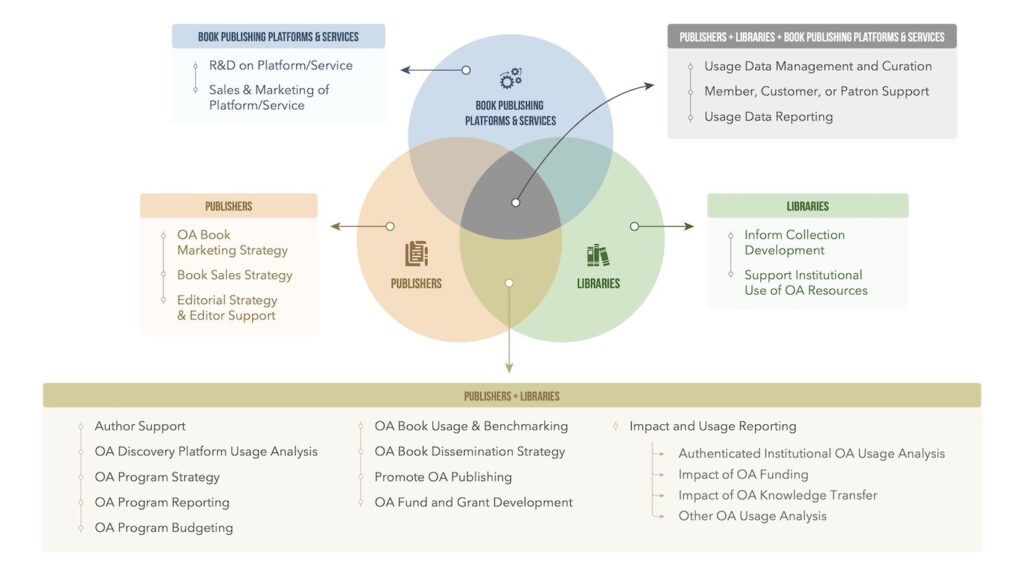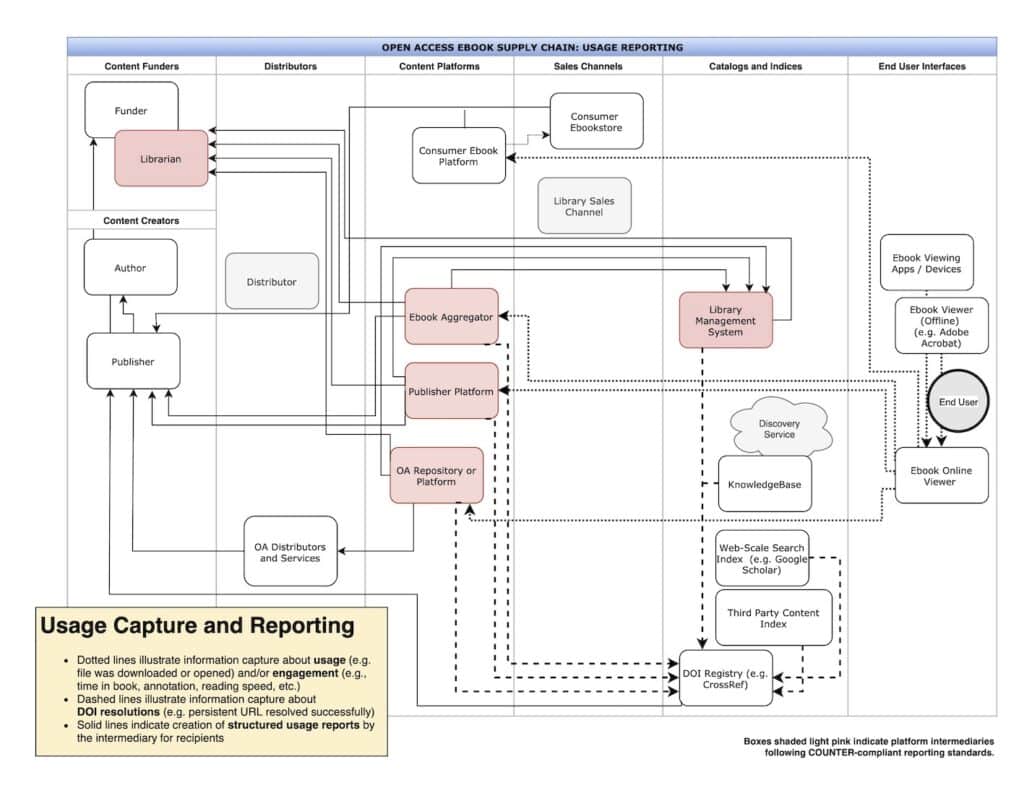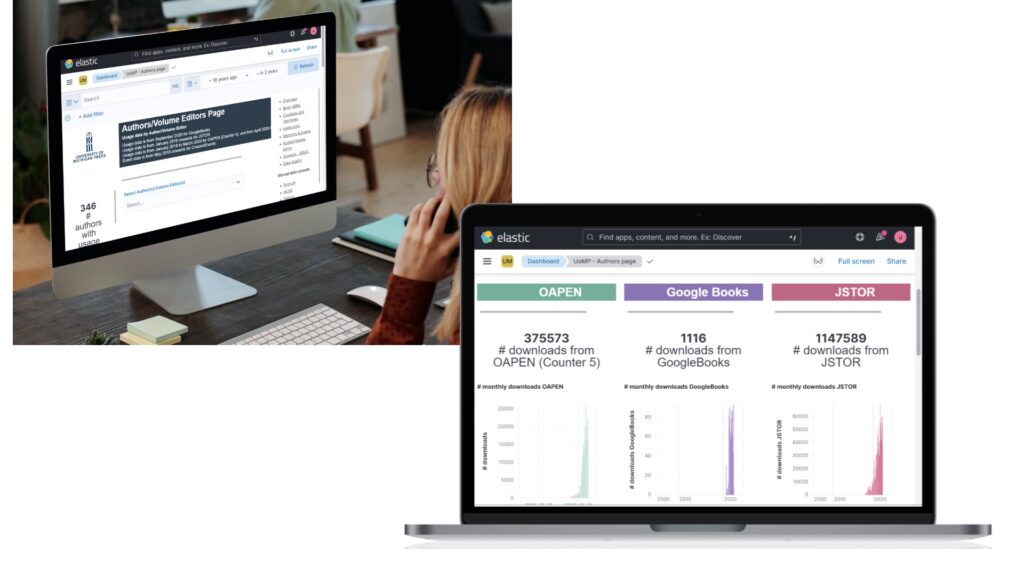Subscribe to our newsletter
Taking Open Access book usage from reports to operational strategy

Understanding how many times an open access (OA) book has been viewed or downloaded is only part of the story – what you then do with the data is when the tale really unfolds…
Note: This blog post includes excerpts from the OA eBook Usage Data Analytics and Reporting Use-cases by Stakeholder report by Drummond and Hawkins.
While the term “usage data” most often refers to webpage views and downloads associated with a given book or book chapter, scholarly communications stakeholders have identified a near future where linked open access (OA) scholarship usage data analytics could directly inform publishing, discovery, and collections development in addition to impact reporting.
In the 2020-2022 Exploring Open Access Ebook Usage research project supported by the Mellon Foundation, publisher and library representatives expressed their interests in using OA eBook Usage (OAeBU) data analytics to inform overall OA program investment, strategy and fundraising. A report summarizing a year of virtual focus groups noted multiple operational use cases for OA book usage analytics, spanning book marketing, sales, and editorial strategy; collections development and hosting; institutional OA program strategy, reporting, and investment; and OA impact reporting for institutions and authors to support reporting to their funding agencies, donors, and policy-makers.

“In order to realize the full benefits of OA data usage we must create an ecosystem that operates according to open data sharing, security, and use principles.”
Christina Drummond, OA Book Usage Data Trust
Evidence-based decision-making depends on comprehensive, quality data. The tale of an OA book or author’s impact depends upon marrying usage data created by a plethora of publisher platforms, digital libraries, and OA repositories with linked citation information from scholarship, syllabi, gray literature and policy proceedings. As Laura Ricci and Michael Clarke elegantly documented, OA book usage data is created at multiple points across the book supply chain, to be ultimately curated and collated by each library, publisher, and library management system working with OA titles.

The work required to produce cross-platform, contextual usage-related OA reports and analytics is significant. Such data aggregation and reporting requires the processing and curation of numerous COUNTER-compliant and non-compliant reports, APIs, dashboards, and spreadsheets.This resource-intensive exercise requires specialized expertise to understand which metrics can (and cannot) be combined while annotating bot traffic, avoiding data quality issues, and reporting on publicly available data alongside information that’s accessible per data-use agreements. While larger operations have access to such expertise, smaller presses, publishers, and start-ups risk being unable to do so, thereby missing out on derived strategic insights.
OAeBU data can inform service relationships as publishers and libraries seek to understand online book distribution niches or evaluate book hosting and dissemination offerings. Similarly, publishing platforms and services can leverage usage data to improve and target their own offerings for the scholarly communications community. Yet context is key. As illustrated through pilot OA monograph usage data dashboards developed by the Curtin Open Knowledge Initiative, innovation is occurring around usage data dashboards and analytics services to meet the specialized needs of publishers, libraries, funding agencies, and scholars.

To fully analyze the impacts of Open Access on society, scholarly communications stakeholders must improve OAEBU data quality, processing, and reliability. Federated national or regional data infrastructure efforts already suggest ways to facilitate data processing and exchange across public and private organizations big and small. The US-based National COVID Cohort Collaborative is simplifying the controlled, ethical data sharing, aggregation, and use of COVID trial data across public and commercial research labs. European industry-based collaboratives are applying International Data Space (IDS) standards and certifications to facilitate public and private data exchange for mobility, logistics, and healthcare. Supported by the Mellon Foundation, a team led by PIs at the University of North Texas, OPERAS, OpenAIRE, and Johns Hopkins University is working to build upon past efforts to: a) host community consultations to create a multilateral data-processing and stewardship rule book for OA book usage data, b) quantify data trust participation benefits for book publishing stakeholders, and c) understand the full operational costs related to an international data space for OA book usage. If successful, this OA Book Usage Data Trust effort could make usage data management and reporting less costly and more accessible for all open monograph stakeholders.
While the use of data space infrastructure will drive economies of scale – and therefore cost savings – for book publishing stakeholders, in order to realize the full benefits of OA data usage we must create an ecosystem that operates according to open data sharing, security, and use principles. By fostering trusted, responsible, direct data exchange, our researchers, publishers, libraries, funders and the wider community will all stand to gain.

About the Author
Christina Drummond, Executive Director | OA Book Usage Data Trust
For over 20 years, Christina has worked at the intersection of data analytics, strategy, and policy. As the Executive Director for the OA eBook Usage Data Trust effort, Christina is helping to improve the quality, completeness, and timeliness of OA impact data while reducing reporting costs through better global usage data exchange, aggregation and governance.
